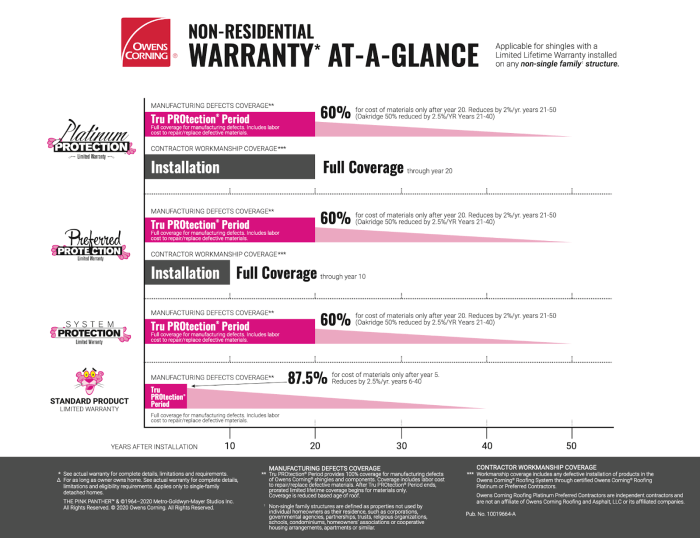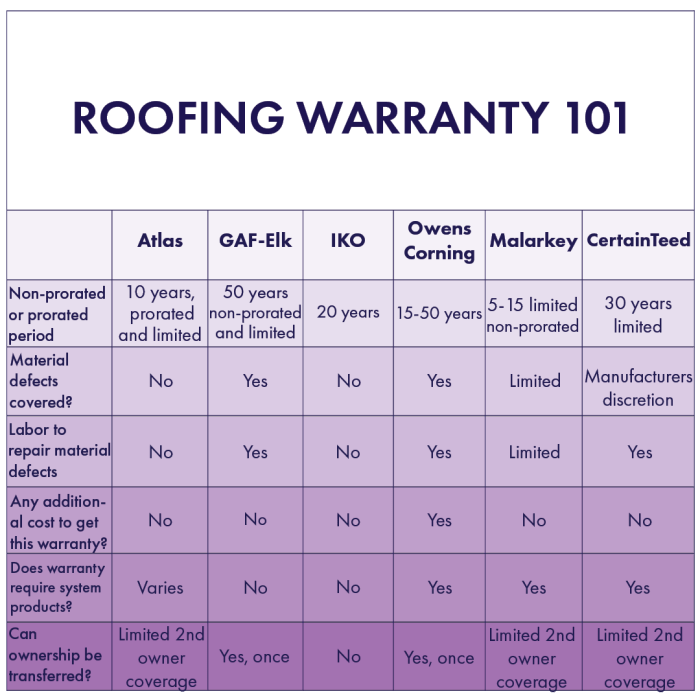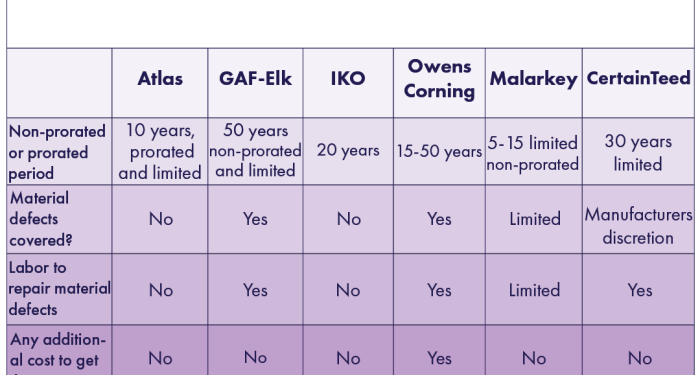Roofing warranty options set the stage for this enthralling narrative, offering readers a glimpse into a story that is rich in detail and brimming with originality. This article delves into the intricacies of different warranty types, coverage details, and the claim process, providing valuable insights for homeowners and contractors alike.
As we uncover the various facets of roofing warranties, readers will gain a comprehensive understanding of the key factors to consider when navigating the world of warranty options.
Roofing Warranty Types

When it comes to roofing warranties, there are different types available in the market to provide homeowners with peace of mind regarding their investment. Let's explore some common roofing warranty options and compare the coverage offered by manufacturer warranties versus contractor warranties.
Manufacturer Warranties
Manufacturer warranties are typically provided by the company that produces the roofing materials. These warranties often cover defects in the materials used for a specific period, such as 20 to 50 years. They may also offer protection against premature deterioration, ensuring the quality of the roofing system.
Contractor Warranties
On the other hand, contractor warranties are offered by the roofing installation company and focus on the workmanship and installation process. These warranties usually cover labor and installation issues for a certain period, such as 1 to 10 years. They ensure that the roof is installed correctly and functions as intended.
Comparison
- Manufacturer warranties primarily cover material defects and premature deterioration, while contractor warranties focus on workmanship and installation issues.
- Manufacturer warranties tend to have longer coverage periods compared to contractor warranties.
- Homeowners should carefully review the terms and conditions of both types of warranties to understand the extent of coverage and any exclusions that may apply.
Understanding Warranty Coverage
Roofing warranties typically cover defects in materials or workmanship for a specified period of time. This coverage can provide homeowners with peace of mind knowing that they are protected in case any issues arise with their roof.
What is Covered
- Defects in materials such as shingles, flashing, and underlayment
- Workmanship issues related to the installation of the roof
- Water leaks caused by roofing issues
Exclusions and Limitations
- Normal wear and tear from weather exposure
- Damaged caused by lack of maintenance or neglect
- Acts of nature such as hurricanes, tornadoes, or earthquakes
Variability Based on Materials and Installation
Warranty coverage can vary depending on the materials used for the roof, as well as the installation methods employed. For example, some roofing materials may have longer warranty periods due to their durability, while certain installation techniques may impact the coverage provided by the warranty.
Length and Terms of Warranties
When it comes to roofing warranties, understanding the length and terms is crucial for homeowners looking to protect their investment. Let's delve into the typical duration of roofing warranties, how it varies between different materials, and the importance of knowing the terms and conditions.
Duration of Warranties
Roofing warranties can vary in length depending on the type of material used. Here is a breakdown of the typical duration for different roofing materials:
- Asphalt shingles: Typically come with warranties ranging from 20 to 30 years.
- Metal roofing: Often offers warranties of 30 to 50 years, or even a lifetime warranty in some cases.
- Wood shakes: Generally have warranties that last around 30 years.
- Tile roofing: Can come with warranties ranging from 50 to 75 years.
Variability of Warranty Length
The length of roofing warranties can vary based on factors such as the quality of materials, installation methods, and manufacturer policies. It's essential to check the specific warranty terms to understand what is covered and for how long.
Importance of Understanding Terms and Conditions
Reading and comprehending the terms and conditions of a roofing warranty is crucial to ensure that you are aware of any limitations or requirements. Some key points to consider include:
- Proper installation and maintenance may be necessary to maintain warranty coverage.
- Exclusions like natural disasters or improper repairs may void the warranty.
- Transferability of the warranty in case of selling the home.
Warranty Claim Process

When it comes to making a warranty claim for roofing issues, there are specific steps that homeowners need to follow. It's important to understand the process and be prepared to document and report problems effectively to expedite the claim process.
Documenting and Reporting Problems
- Take photos or videos of the roofing issue as soon as it is noticed. Make sure the documentation is clear and captures the extent of the problem.
- Keep all receipts and records related to the installation and maintenance of the roof. This documentation will be important when filing a warranty claim.
- Contact the roofing manufacturer or contractor as soon as the issue is identified. Provide them with detailed information and evidence of the problem.
Best Practices for Homeowners
- Read through the warranty documentation carefully to understand the coverage and limitations of the warranty.
- Follow the recommended maintenance and inspection schedule provided by the roofing manufacturer to prevent issues and ensure warranty validity.
- Keep communication channels open with the roofing contractor or manufacturer throughout the warranty claim process. Stay informed about the status of the claim and any required actions.
Ultimate Conclusion
In conclusion, roofing warranty options play a crucial role in ensuring the longevity and protection of your roof. By being informed about the types of warranties available, coverage details, and the claim process, you can make well-informed decisions that safeguard your investment for years to come.
Stay tuned for more expert tips and advice on roofing maintenance and protection.
Questions and Answers
What factors should I consider when choosing a roofing warranty?
Consider the duration of the warranty, coverage specifics, and whether it's a manufacturer or contractor warranty.
Are there any common exclusions in roofing warranties?
Common exclusions may include damage from natural disasters or improper installation.
How can I expedite the warranty claim process?
Documenting issues with photos and detailed descriptions can help expedite the claim process.












